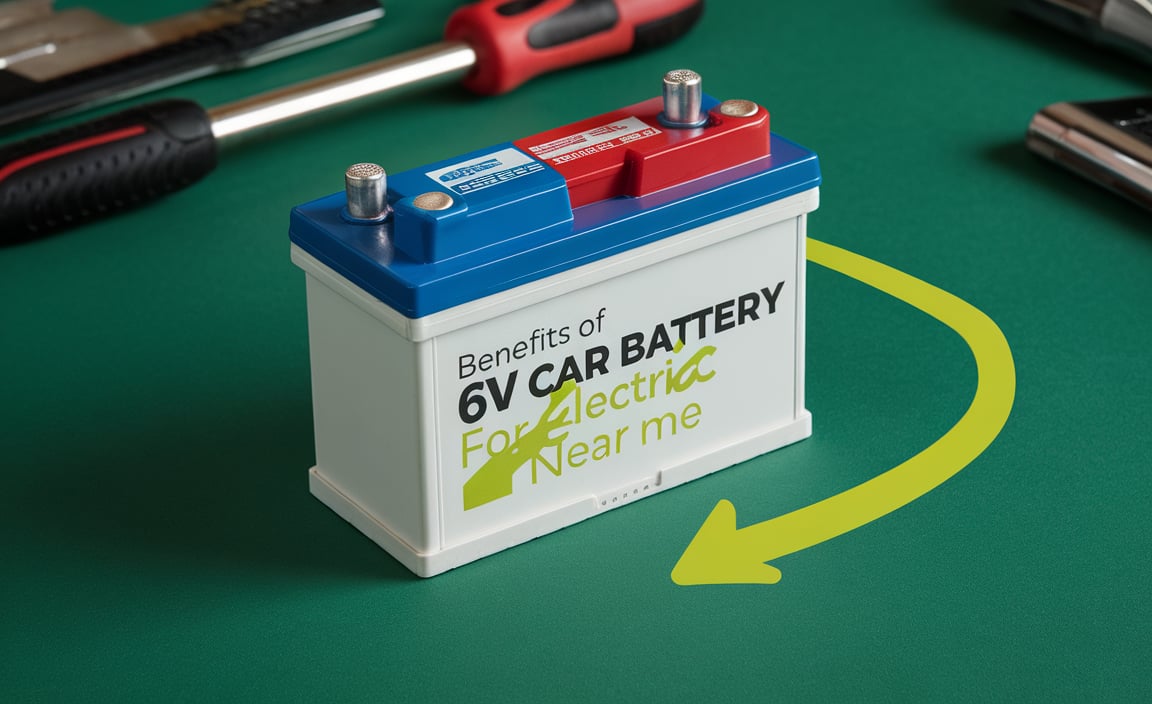Quick Summary: Yes, you can recycle your old car battery for cash! Many auto parts stores, scrap yards, and recycling centers pay you for bringing in used lead-acid car batteries. This is a great way to get a little money while doing something good for the environment.
Is your car battery getting old and weak? Do you know how much that old battery is actually worth? Many car owners wonder what to do with a dead car battery. It’s heavy, it’s full of acid, and it looks like junk. But here’s a secret: that old battery is a little goldmine! You can actually get paid to recycle it. We’ll show you exactly how to turn that old battery into cash safely and easily. Let’s learn how to make some money while keeping the planet clean.
Recycle Car Batteries For Cash: Proven Rewards
Thinking about replacing your car battery? Before you just toss it, hold on! That old lead-acid battery sitting in your garage or trunk isn’t just waste; it’s a valuable resource. In fact, you can get paid to recycle it. This guide will walk you through everything you need to know about turning your old car battery into cash, making it a win-win for your wallet and the environment.
Why Recycle Your Car Battery?
Car batteries are made with lead and acid, materials that can be very harmful if thrown away improperly. Recycling them prevents pollution and allows valuable materials to be reused. But beyond the environmental benefits, there’s a tangible reward: money!
The Value of Lead-Acid Batteries
Lead-acid batteries have been around for a long time. They are heavy because they contain a lot of lead. Lead is a valuable metal. When you take your old battery to a recycler, they can recover this lead, as well as the plastic casing and the sulfuric acid (which is neutralized and treated). These recovered materials can then be used to make new batteries and other products.
Environmental Impact of Proper Disposal
Throwing a car battery in the regular trash is a big no-no. The lead and acid can leak into the soil and groundwater, causing serious environmental damage. Recycling ensures that these harmful components are handled safely and responsibly. According to the U.S. Environmental Protection Agency (EPA), over 98% of lead-acid batteries are already recycled in the United States, making them one of the most recycled consumer products. This high recycling rate is not only due to environmental regulations but also the economic incentive for consumers and businesses to recycle.
How Much Can You Get for a Car Battery?
The amount of cash you can get for your old car battery depends on a few things. The most common factor is the weight and the current market price of lead. On average, you can expect anywhere from $5 to $20 per battery, sometimes more. The exact price varies by location and by the buyer.
Factors Affecting the Price
- Weight of the Battery: Heavier batteries generally mean more lead, which means more money.
- Current Lead Prices: The global price of lead fluctuates, affecting how much scrap yards will pay.
- Condition of the Battery: While it’s a “dead” battery, if it’s not severely damaged (beyond normal wear), it’s usually accepted.
- Buyer’s Policy: Different recycling centers, auto parts stores, and scrap yards have their own pricing structures.
It’s always a good idea to call a few places in your area to compare prices before you head out.
Where to Recycle Your Car Battery for Cash
Finding a place to recycle your old car battery is usually quite straightforward. Several types of businesses accept them and often offer payment.
1. Auto Parts Stores
Many major auto parts retailers, like AutoZone, Advance Auto Parts, and O’Reilly Auto Parts, have core charge programs. When you buy a new battery, you pay a core charge upfront. When you return your old battery, you get this charge back. Sometimes, even if you don’t buy a new battery, they will still buy your old one outright.
2. Scrap Metal Yards
Scrap metal yards are businesses that buy and process various types of metal, including lead. They weigh your battery and pay you based on the current price of lead. This is often where you’ll get the most competitive price per pound.
3. Battery Specialists and Recyclers
Dedicated battery recycling companies or specialized auto shops are also excellent options. They are experts in handling batteries and can offer fair prices.
4. Local Garages and Mechanics
Some independent garages and mechanics might accept old batteries, especially if they work with a local scrap yard. It’s worth asking your regular mechanic.
How to Safely Handle and Transport Your Old Car Battery
Car batteries contain sulfuric acid, which is corrosive, and they are heavy. Safety should be your top priority when removing, handling, and transporting your old battery.
Safety Precautions
- Wear Protective Gear: Always wear safety glasses or goggles to protect your eyes from acid splashes. Wear sturdy gloves to protect your hands from acid and to get a good grip. Old clothing is also recommended.
- Avoid Sparks: Never smoke or create sparks near a car battery. Batteries can release flammable hydrogen gas, which can explode.
- Keep it Upright: Always transport the battery in an upright position to prevent acid from leaking out.
- Handle with Care: Car batteries are heavy (often 30-50 pounds). Lift with your legs, not your back, to avoid injury.
Tools You Might Need
- Socket wrench or wrench set (to disconnect terminals)
- Battery terminal puller (optional, but helpful)
- Gloves
- Safety glasses
- A sturdy piece of cardboard or a battery carrier to place the battery on for transport
- A way to secure the battery in your vehicle (e.g., a sturdy box or a strap)
Transporting Your Battery
When you get to the recycling location, you’ll typically place the battery on a scale. Ensure it’s upright and not leaking. Most places are equipped to handle them safely once you arrive.
Step-by-Step Guide: Removing and Recycling Your Car Battery
If you’re feeling confident, you can often remove your car battery yourself. If not, a mechanic or auto parts store can usually do it for you, often for a small fee or for free if you’re buying a new battery from them.
Step 1: Prepare Your Vehicle and Tools
Park your car on a level surface. Turn off the engine and remove the keys from the ignition. Gather your tools: gloves, safety glasses, wrench set, and a way to carry the battery. Ensure you have a replacement battery ready if needed.
Step 2: Locate and Disconnect the Battery
Open the hood and find the battery. It’s usually on one side of the engine compartment. It will have two terminals: one positive (+) and one negative (-). The red cable is usually positive, and the black cable is negative. Make sure the engine is completely cool.
Step 3: Disconnect the Cables (Order is Crucial!)
Always disconnect the negative (-) terminal first. This prevents accidental short circuits. Use your wrench to loosen the nut on the negative terminal clamp. Once loose, wiggle the cable off the terminal. Then, repeat the process for the positive (+) terminal. If the cables are stuck, a battery terminal puller can help.
Step 4: Remove the Battery Hold-Down Bracket
Most batteries are secured by a bracket or clamp at the base or over the top. Locate the bolts or nuts holding this bracket and remove them with your wrench. Keep track of these parts!
Step 5: Lift Out the Old Battery
With the cables and hold-down removed, you should be able to carefully lift the battery out. Remember, it’s heavy! Use your legs and get a firm grip. Place it immediately onto a piece of cardboard or into a sturdy container to prevent any acid from damaging your car’s surface.
Step 6: Take Your Battery to a Recycling Center
Now, it’s time to get that cash! Transport your battery safely (see above section). Drive to your chosen auto parts store, scrap yard, or battery recycler. They will weigh the battery and pay you on the spot. Don’t forget to ask for your receipt!
Pro Tip: If you’re unsure about any step, especially disconnecting the battery, it’s always best to have a professional do it. Many auto parts stores offer free battery testing and installation services.
Understanding the Different Types of Batteries and Recycling
While this guide focuses on car batteries, it’s worth noting other battery types and their recycling processes.
Car Batteries (Lead-Acid)
These are the most common automotive batteries, designed for starting engines. They are robust and highly recyclable. The high lead content makes them valuable for their material.
Phone Batteries (Lithium-ion)
Your smartphone battery is a different beast. These are typically lithium-ion batteries. They require specialized recycling processes due to their chemistry and potential fire hazards if damaged. Many electronics stores and municipal waste facilities have collection points for these. Money isn’t usually exchanged directly for these, but recycling is crucial.
Power Banks (Lithium-ion/Polymer)
Similar to phone batteries, power banks also use lithium-based technology. They should be recycled at designated electronics drop-off locations, not put in regular trash or recycling bins. Some retailers offer trade-in programs.
Charging Devices (Adapters, Chargers)
These are electronic waste (e-waste). Small electronic items like phone chargers and power adapters can often be taken to e-waste recycling centers or specific retailer take-back programs. They don’t typically have a cash-in value for consumers.
The Life Cycle of a Recycled Car Battery
It’s fascinating to see what happens to your old battery after you hand it over. The recycling process is efficient and ensures minimal waste.
- Collection: Batteries are collected from various sources (retailers, scrap yards, individuals).
- Crushing and Separation: Batteries are often crushed. The battery acid is drained and neutralized. The plastic casing is separated from the lead plates and other components.
- Smelting: The lead components are melted down in a furnace at high temperatures to purify the lead.
- Re-casting: The purified lead is cast into new battery plates.
- Manufacturing: New batteries are manufactured using these recycled materials, along with new plastic and acid.
This closed-loop system means that up to 99% of the lead from an old battery can be recovered and used in a new one. This significantly reduces the need for mining new lead ore, which is an energy-intensive and environmentally impactful process.
Table: Where to Recycle and What to Expect
| Location Type | Likely Payment Range (per battery) | Notes |
|---|---|---|
| Major Auto Parts Stores (e.g., AutoZone, Advance Auto Parts) | $5 – $15 (often as a core charge refund) | Easiest option if buying a new battery. May buy outright without purchase. |
| Local Scrap Metal Yards | $8 – $20+ | Best potential for cash, especially if they specialize in lead. Price fluctuates with lead market. |
| Battery Specialists/Recyclers | $7 – $18 | Expert handling, often reliable pricing. |
| Independent Garages/Mechanics | Varies significantly (often $0-$10, or donate) | May offer a small amount or take it without payment. |
Note: Prices are estimates and can vary greatly by region and current market conditions. Always call ahead.
Frequently Asked Questions (FAQs)
Q1: Can I really get cash for an old car battery?
A1: Yes, absolutely! Most places that accept car batteries for recycling, like auto parts stores and scrap yards, will pay you for them. It’s a common practice because the lead inside is valuable.
Q2: How much is an old car battery generally worth?
A2: You can typically expect anywhere from $5 to $20 per battery. The exact amount depends on the battery’s weight, the current price of lead, and where you are recycling it.
Q3: Are there any risks involved in handling a car battery?
A3: Yes, car batteries contain corrosive sulfuric acid and can produce explosive gases. Always wear safety glasses and gloves, work in a well-ventilated area, and avoid sparks or flames near the battery.
Q4: What if my car battery is damaged or leaking acid?
A4: Most recyclers will still accept damaged batteries, but they might offer a slightly lower price. If it’s severely damaged or leaking significant amounts of acid, handle it with extreme caution and inform the recycling center staff upon arrival.
Q5: Do I need to disconnect the battery myself, or can someone else do it?
A5: You can disconnect it yourself if you have the right tools and follow safety precautions. Alternatively, many auto parts stores will remove and install batteries for you, especially if you are purchasing a new one. Sometimes they can remove the old one for a small fee.
Q6: Can I recycle a car battery that still has some charge?
A6: Yes! A car battery receiving cash payment is usually for its material content (lead), not its remaining charge. A “dead” battery for starting a car can still be valuable for recycling.
Q7: Where can I find a recycling center near me?
A7: You can often find local recycling centers by searching online for “scrap metal yard near me,” “car battery recycling,” or checking the websites of major auto parts retailers. Websites like Earth911.com can also help you locate recycling facilities in your area.
Choosing the Right Time to Recycle
While you can recycle your car battery any time it’s no longer needed, there are a couple of considerations.
When Your Battery Dies
The most obvious time is when your car battery is no longer holding a charge or is significantly weakening. Don’t wait too long after it dies, as it’s best to get it to a recycling center promptly.
When Upgrading
If you’re upgrading to a more powerful or specialized battery, your old one is an excellent candidate for recycling and earning some cash back.
Recycling as a Regular Maintenance Task (for Mechanics)
For auto shops, managing a steady stream of old batteries is part of their business. They often have established relationships with scrap yards to ensure efficient recycling and profit from the materials.
Alternatives to Selling Your Old Battery
While getting cash for your old car battery is popular, there are other options:
Donating to Charity
Some local charities or community programs might accept old but still functional car batteries for use in their own equipment or for resale to fund their operations. It’s less common for completely dead batteries, though.
Giving to DIY Enthusiasts
If you know someone who enjoys working on cars or has specific projects where a battery might be useful (even a weaker one), you could offer it to them.
Conclusion
Recycling your old car battery for cash is a smart move. It’s an easy way to make a few dollars, clear out clutter, and do your part for the environment. With valuable lead content, these batteries are highly sought after by recyclers. By following the safety guidelines and knowing where to go, you can confidently turn that heavy, used battery into a small financial reward while supporting sustainable practices. So next time your car battery gives up the ghost, remember its hidden value and get it recycled!



